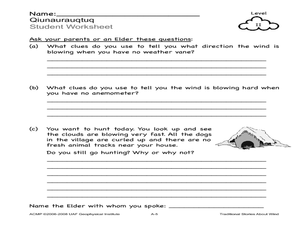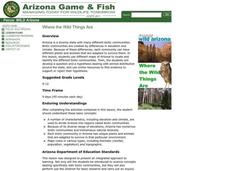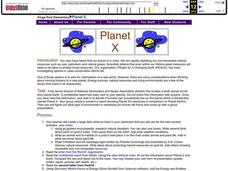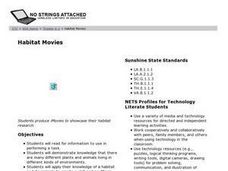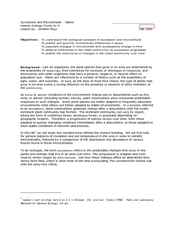Curated OER
Traditional Stories about Wind
Students observe and talk about wind using no weather instruments. In this wind lesson plan, students use their senses to observe wind. They also interview an Elder about wind.
Curated OER
Where the Wild Things Are
Young scholars examine the characteristics that divide Arizona into different regions. In this resources lesson students complete a worksheet on the biotic communities Arizona has.
Curated OER
The Giant Barrel Sponge
Pupils study barrel sponges. In this science and art lesson, students discuss what sponges are, create their own sponge, and share what they created with the rest of the class.
Curated OER
Congressional Scenarios
In this U.S. government worksheet, students read 12 scenarios pertaining to government intervention and determine what to do as lawmakers in response to each of the scenarios.
Curated OER
Hula Hoop Habitats
Students explore migration. In this science lesson, students play a game in which they explore bird migration. Students discuss the needs of birds and play a game in which they "migrate" in order to meet their needs.
Curated OER
Where Are the Dinosaurs?
Students explore what the dinosaurs were like. In this dinosaur lesson, the teacher peaks student curiosity about dinosaurs. This lesson would be a great starting point for a dinosaur unit since it primarily engages student interest and...
Curated OER
Terrestrial Communities
Students watch a video about different terrestrial communities. They conduct an experiment with sponges conserving water. They research desert characteristics comparing them with other biomes.
Curated OER
"Home Sweet Home?"
Students research an endangered animal's habitat, investigate the survival problems. They research the animal's zoo life. They research some programs of reintroduction and chart the pros and cons of each.
Curated OER
Seashore Limitations
Pupils demonstrate the movements and behaviors of creatures from different parts of the ocean.
Curated OER
Alligator
Students create a model of an alligator out of clay using both artwork and research to guide their finished work.
Curated OER
Aquatic Communities
Students watch a video about aquatic communities. They conduct an experiment that shows how movement of rivers change the landscape. They compare fresh and salt water communities and its wildlife.
Curated OER
Diversity and Adaptations of Organisms
Eighth graders discover the difference between extinct and endangered animals and discuss the reasons why this has occured. They identify threatened and endangered animals living in their local area as well.
Curated OER
National Parks
Students create national park brochures on selected endangered animals using research information, hand-drawn pictures, and the Pages and KeyNote software programs. This lesson was written for a TAG classroom.
Curated OER
Planet X
Students select a wide variety of presentation methods to compare Planet X and Earth. Students share these with their classmates. Students select other methods to present their ideas about a livable planet for human life forms. ...
Curated OER
the Wonder of Wetlands
Students explore the importance of the wetland ecosystem, its properties and functions, as well as, the many birds, animals, and plant life found there.
Curated OER
Habitat Movies
Learners create movies of various habitats and animals using their knowledge of the subject and the computer program iMovie. Emphasis is placed on cooperative learning and research.
Curated OER
Mapping the Village
Students measure, weigh, and document the amount of trash and garbage generated by the school for one day. They brainstorm solutions for trash in the area and assist with the school-wide recycle program.
Curated OER
Wildlife Habitat
High schoolers explain what a habitat is and describe its four elements. They see how an area's habitat suitability varies with different species of wildlife. They name factors that affect habitat suitability.
Curated OER
Habitat Lap Sit
Fourth graders physically form a circle that shows the interconnectedness of the components of a habitat. They form circles and role play the parts of habitats.
Curated OER
This Is Tree-rific!
Third graders view a clip of the video Backyard Safari, "Trees," and portray the life cycle of a tree. They also view a clip on structures of a tree and draw a diagram of a tree in their science journals.
Curated OER
Succession and Microclimate
Young scholars compare the population of insects in different microclimates. In this biology instructional activity, students collect data using probes to tabulate temperature and soil data. They predict how certain parameters...
Curated OER
Analyze the Results
Students conduct water tests and sample macroinvertebrates from a nearby source to make a general determination about the overall quality of water. They use worksheets and analyze data as part of a larger unit.
Curated OER
Critters of the Water
Young scholars examine different organisms in various marine habitats. They identify any adaptations that have allowed the organisms to survive. They develop an imaginary organism and describe its life cycle.
Curated OER
Bioluminescent Bewilderment!
Ninth graders investigate the concept of bioluminescent. They break down the word phonetically for correct pronunciation. This is done as a warm up for learning. Then students create a list of the creatures from prior knowledge and...


